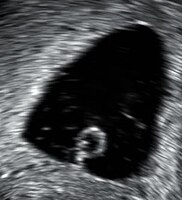
Photo from wikipedia
INTRODUCTION Maternal metabolism undergoes dynamic changes during pregnancy. A deviation from this physiological metabolic status might be involved in the pathogenesis of pregnancy complications, such as recurrent pregnancy loss (RPL).… Click to show full abstract
INTRODUCTION Maternal metabolism undergoes dynamic changes during pregnancy. A deviation from this physiological metabolic status might be involved in the pathogenesis of pregnancy complications, such as recurrent pregnancy loss (RPL). Decidua is an important uterine tissue, which provides immunological protection as well as nutritional support to the developing embryo during early pregnancy. Previous studies have shown that aberrant metabolism of the decidua is related to the etiology of RPL. However, the metabolic profile of the decidua in RPL has not yet been fully elucidated. METHODS In the current study, decidual samples from RPL patients (n = 23) and normal pregnancy (NP) women (n = 30) were collected, and hydrophilic and hydrophobic metabolites were extracted and measured using a liquid chromatography electrospray ionization tandem mass spectrometry system. Besides, the mRNA expression of several critical enzymes involved in sphingolipid metabolism and glycerophospholipid metabolism was detected. RESULTS The OSC-PLS-DA scores plot illustrates that metabolic differences are present in the decidual tissue of RPL patients compared with that of NP women. Combining multivariate analysis with univariate statistical analysis, a total of 62 metabolites related to RPL were selected, including carnitine, glycerophospholipids, sphingomyelin (SM), ceramide, organic acids and their derivatives, and amino acid metabolomics. KEGG analysis showed that abnormalities in multiple metabolic pathways occurred in RPL decidua, including vitamin digestion and absorption, tryptophan metabolism, citrate cycle, arginine biosynthesis, glycerophospholipid metabolism, sphingolipid metabolism, and sphingolipid signaling pathway. Increased SM synthase and decreased Phospholipase A2 Group IIE mRNA levels were detected in RPL compared with NP group. DISCUSSION Disruption of decidual metabolism, especially glycerophospholipid metabolism and sphingolipid metabolism, might be involved in the occurrence of RPL.
Journal Title: Placenta
Year Published: 2021
Link to full text (if available)
Share on Social Media: Sign Up to like & get
recommendations!